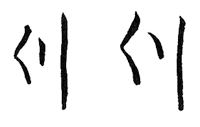
The Three Areas
of the Whole Body
怱体に三停ある事
Sotai ni Santei Aru Koto
This is the second chapter of Natori’s discussion on physiognomy, the art of telling someone’s character by their dimensions and features. Before we scoff at this skill and pass it off as medieval madness, we must realize that this was a profound and respected skill for over two thousand years, from ancient Greece to medieval Europe. With resurgences and declines, it has nearly always been a part of modern human culture. However, Natori confuses the issue more by mixing this ancient “science” with divination and fortune telling, to the point where the two are inseparable. This does make sense considering that science, magic, and religion were synonymous for the medieval mind. There are three things we can take from this: Firstly, that Natori has faith in a higher understanding and a sense of belief that penetrates his life; Secondly, that he is actively investigating what it means to be human, a topic of universal appeal and under continuous study and scrutiny; And lastly, that he has the modesty and sincerity to admit that he is no expert.
The top section of the head is called the jotei 上停. If you are a leader of people and have a large head, you will not be poor but also, you will not live long. A person with a small and elongated head will have bad luck for all his life. Also, those with shaking knees when sitting, having a small waist like a bee, and downturned corners of the mouth are said to have dire luck in life.
The part from the shoulders to the hips is called chutei 中停. If the length of this area is short, you will die young or you will be evil-natured. If this area from the shoulders to the hips is shorter than legs, you are considered to be poor and mean. Those women with straight shoulders that have sharp edges have to wait for men as they don’t have a matchmaker to get them a good marriage.
The part from the hips to the ankle is called katei 下停. If it is longer than the chutei, the shoulders to the hips, you will be sick a lot or will move to another province. When you laugh at others, covering your mouth with your hand, scratching your eyebrow or looking at them sideways, this is the sign of a prostitute. Also, those women who have a bony body are considered as being servants.
Those who have proper proportions within these three parts are considered to have good luck. If anything is too big, small, long, or short, it is called shoakuso 少悪相 the concept of slightly bad luck.
The jotei 上停 or top of the head.
This is called the roppu 六府, or “the six bones,” which are the malar cheekbones, zygomatic bones (lower part of the eye socket and cheek bones), and the lower mandible. Those with these bones that can be seen from the surface, and are full-fleshed with no hollows and have a quite flat and smooth face are considered to have a lucky face. When walking, those walking with their bodies swinging and hips sticking out behind are considered mean-minded. People with wide nostril wings are considered to be mean and shabby.
Also, it is said there are signs of prosperity and long life, they are as follows and resemble Buddhist teachings:
1. A full-fleshed top of the head
2. A large belly when the back is relaxed
3. Red lips and white teeth
4. Round ears with thick earlobes
5. A straight ridge of the nose
6. Eyes with the black and white parts distinct. Beautifully arched and long eyebrows
7. Sloping shoulders with a flat and broad chest
8. A round and flopping belly
9. To be equally proportioned in these 3 areas, full-fleshed, bones with no contortions, long arms and/or long legs
Furthermore, the mouth should be like a halo,* the eyes should be clearly lighted, with the eyelids not drooping down, the face not frowning when looking at something. Gentle-looking eyes, but with the corner having the ability to be raised quickly when looking. Having wrinkles and clean skin of the face while having a dignified look even when not angry and to be calm and have a honorable presence. It is a positive characteristic to be like a big ship tossing on the waves, not upset even when angry, never losing the equilibrium of the mind even when in grief. Those who have all these features of the six bones of roppu are said to have a fortune and to live a rich, precious, happy, and long life.
Further propositions of a positive nature are:
Having a great voice that carries well; a clear mind; to be heavily boned; having a large forehead; thin inside ends of the eyebrows; being motionless while speaking; to look like a mountain when sitting, smelling good like orchids and the Japanese Judas tree.†
Also:
Ears that can’t be seen when viewed head on; a long tongue; round-ended, thin and long fingers; hands that reach below the knees* when the arms are in a relaxed position at your side; having hair or a mole on the soles of the feet.† Those people with these features are destined to become a saint and could be the ruler of the world. It is also positive if the five features of eyes, ears, nose, mouth and chin are good looking, well-shaped, and clean. A resonant voice, good long breathing, no gaps between the teeth and a moistness of the mouth are needed for a good character. Navels should be so deep as to have the ability to hide the fruit of jujube, which means you need a deep navel. Bellies that are not so flat but pulling down. Smooth skin, patience in eating, a still neck when swallowing, these are also signs of good luck.
Indications of Long Life:
1. To be heavily bearded under the nose, having much hair inside of the ears and the nose
2. A refreshing, straightforward character
3. A fine bony framework, hard flesh, flexible muscles and resonant voice
4. To be tall, cheekbones close to the ears, big long ears having much hair inside them, long eyebrows with some gray hair
5. The noko 脳戸 point and the chinkotu 枕骨occipital bone should have a good length
6. A moist palm, well-fleshed insteps, and to be happy-looking
All these are indications for long life.
On the other hand here are a few examples of signs of bad luck:
1. Those who look at others from under his brows and have protruding eyes will not have a good rapport with people
2. Eyes that are hidden when laughing
3. A grimy face, with many moles
4. A deep and gravel-like voice
5. Irregular teeth
6. For the pinna (the fleshy extremes of the ears) to not have some forward curl
7. A thick head of short hair
These are signs of bad luck that will be with you all through life.
Those who don’t wake quickly, with their body becoming cold like ice when in sleep, are shabby in nature.
Those who have a mole between their eyebrows are humble to others. The shaking of knees and rubbing of the face while bowing the head are indications of adultery in women. Such women seek for illicit relationships or another marriage with other men outside of the marital bed.
The Parts of the Body
The Head
If the forehead is boxy in nature and has “corners” on both sides, with the bones behind the ears being protuberant, like horns, which are named jukotsu 寿骨, indicate a long life. A round-shaped head, of short length, is a sign of wealth and high rank. White hair, but black in the back of head, indicates excellent luck. A round upper head or boxy-shaped head that feels moist also denotes good luck. Black thin hair means prosperity if one gets into office. Thick and long hair* indicates bad luck. A low hairline on the nape of the neck is also a bad sign. Those with low hair that whorls down to the nape are said to be suspicious.
The Eyebrows
Thin, flat and moist ones are good. Long linear eyebrows are a sign of wisdom. Those who have a mole within the eyebrows are intelligent, wise, and wealthy. Those that are high on the forehead denote a high rank. Those who have white hair in the eyebrows are of a long-life. Those who have a longitudinal wrinkle above eyebrows are wealthy. Those with moist eyebrows are wise and intelligent. Long eyebrows, extending past the eyes means honesty and faithfulness. Those with straight horizontal eyebrows have loyalty to their master. It is also said that a narrow region of the glabella, (the area between the eyebrows) and a standing out of the superciliary bones of the eyebrows are signs of bad luck. Those with scanty eyebrows lie and those with slanted eyebrows are weak natured.
The Eyes
Long, deep, glaring, and moist eyes are the indication of an exalted personage. Black,* shiny, lacquer-like eyes denote the wise, quick-witted, and scholarly attained. Thin and deep eyes are a sign of long life. Those who have birthmarks on both bottom lids are blessed in clothing and food. If the bottoms of both eyes align on a straight line, it is said to be a sign of a lord of a province. Triangle or corn-shaped eyes are of bad luck. Those with badly downward slanting eyes get divorced easily. Those with an upward glance are not faithful and steal.
The Nose
A tip of nose that is not uptilted but prominent enough is an indication of wealth and a long and happy life. Noses with no obvious characteristic are of good luck. The jinchu 人中, or philtrum, is the vertical groove below the nose. A deep, straight philtrum, not narrowing toward the lips but broadening in an A-shape indicates luck. If it is narrow on top and broad at the base, the person will have a lot of children and grandchildren. Those with straight ones have loyalty about them. U-shaped ones, like split bamboo, denote a high rank and wealth. Those with a mole on the top of the nose will have lots of sons, those with one on the base, daughters. Those with ones on both sides of it will have two children. Those with a horizontal line across the philtrum will have no children at all.
There are some people whose philtrums are very flat and scarcely have indentation. You should be aware that they will never have a child. Also it is said those who have a not-so-pointed tip of the nose are liars. Those with horizontal wrinkles on the nose will be involved in an accident caused by a horse and carriage. Those with a high-pointed and hooked nose will defeat others. Those with a scraggy nose will die in other provinces. Those with turned-up nostrils are so poor that they don’t have food at home even for the night of their return.
The Ears
Thick, hard, long ears that are not flat in the shape of its upper part are desirable. A smooth outer ear, that is a smooth and round shaped auricle, with earlobes toward the mouth on a forward inclination indicate wealth and long life. Those with a lot of hair inside the ears have the sign of a long life. Those with moles on the ears are wise, and will bear a child with a person of exalted rank. Wide ear canals indicate wisdom and discretion. Those whose contours of the ears and earlobes are thick and long, have righteousness and loyalty, and if educated, will be known to the whole world. Dirty and ill-shaped ears are of the stupid and poor. Those ears that are higher than the eyes, like a mouse, are poor. Those with turned-up ear canals, with no concavity, will become orphans. Those who have small ears and a big mouth are liars.
The Mouth
Square broad lips, which are a little high on the philtrum, are an indication of exalted personage and long life. Those with red lips shaped like a bow with a string will be high in official rank. Upper and bottom lips, which are broad in width, red and thick indicate good luck and having enough clothes and food. Those with a rectangular-shaped mouth have very good fortune and wealth. Those with thick lips and a thin tongue have good luck. Those with a thick tongue and clear voice are decent. If someone has deep red lips and his or her teeth can’t be seen when he or she smiles, it is an indication of exalted personage. Those with thick upper and bottom lips are said to have loyalty. Also, it is said that sharp and turned-up lips indicate base indecency. Those who move their mouth even when they are not talking will die of hunger. Those with a mouth like a rat defame others and are quite envious. Those whose lips look like the action of blowing on a fire are poor. Those with a vertical line, like a dog, on the mouth will die of hunger.
The Teeth
Big, long, shiny teeth with no gaps indicate good fortune. Those teeth that are not protruding denote wealth and honor. You should be aware that those having 38 teeth are kings,* those with 36 are nobles and princes, 34 are men of wisdom, 32 happy, mean and wealthy, 30 ordinary and with good luck, and 28 base and mean. Those having teeth shaped like pomegranate seeds have good fortune, those with pointed teeth are high in rank, and those with teeth that are shaped like rice grains will have a long life. A red tongue and lips and white teeth indicate learned wisdom. Those with overlapping teeth are bad natured. Those with misaligned and irregular teeth are liars.
The Tongue
Properly long tongues are of good luck. Those whose tongue reaches the nose when sticking it out will ascend the throne or become a lord, those with a hard and flat tongue are of an exalted personage. Those with a thin and long tongue lie. Those with a pointed and short tongue are greedy. Tongues with different colors are a bad sign.
The Hands
Those with slender hands are benevolent and generous. If the hands reach below the knees when the arms are in a relaxed position at the sides, the person is wise. Those who have a small build and big hands have good luck and wealth. Thick hands have the connotation of wealth and nobility. Those having thin and long fingers are intelligent. Those having a thick and long palm are also of an exalted personage. Palms that are thick outward and hollow inward indicate wealth and nobility. Those whose palms are red will be prosperous and successful. Those having a mole on the palms are wealthy and noble. Thin and deep lines of the palm indicate good luck. A straight vertical line on the palm is a good sign. If the line reaches even onto the finger, the person will realize his heart’s desire in everything. Those with many thin lines like a mass of tangled threads on the palm are bright and intelligent. Those with snail-like whorls for fingerprints on all ten fingers and thumbs will reach their height of glory. Thick nails are desirable. In general, those with moist and smooth nails have wisdom.
Also, short and thick hands indicate baseness and greed. Those whose hands don’t reach the hips when the arms are in a relaxed position are ungraceful and mean all of their lives. Those who are of large build and have small hands live in honest poverty, poor but not greedy, so that they will get pleasure out of their lives. Those with smelly and sweaty palms are poor and mean.
The Lines of the Palm
Hated and Undesirable Lines of the Palm
Having the following lines on the palm of people’s hands are signs of negativity.

断頭紋 Dantomon (Lines of beheading)
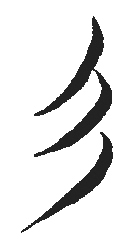
横死紋 Oshimon (Lines of unnatural death)
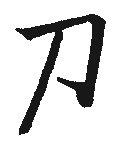
刀字 Toji (The letter 刀“sword”)
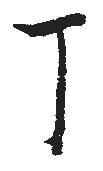
丁字 Teiji (The letter T)
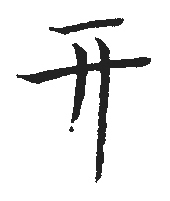
枷鎖紋 Kasanomon (Cangue)*
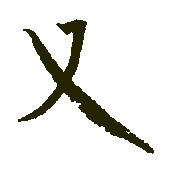
夜叉紋 Yashamon (Demon)
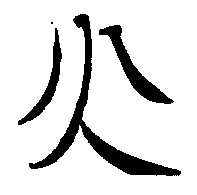
火字 Hinoji (The letter 火 “fire”)
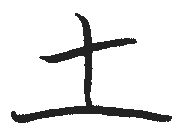
土字 Tsuchinoji (The letter 土 “soil”)
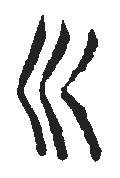
産死紋 Sanshimon (Death of a child)
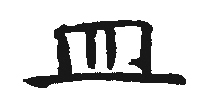
妬妻紋 Tosaimon (Jealous wife)
Lines of Decency, Wealth and Wisdom
People with these lines will have great achievement.
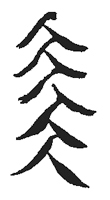
柳絲紋 Ryushimon (Long branches of a willow tree)

三爻紋 Sansamon (Triple letters 乂)
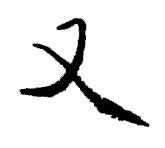
One letter of 乂
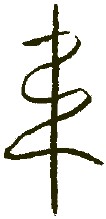
縄紋 Jomon (Rope pattern)
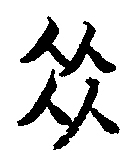
生魚 Seigyo (Fresh fish)
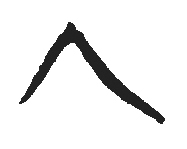
華蓋 Kakai (Flowery cover)
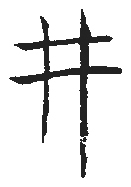
金井 Kanai (Golden well)
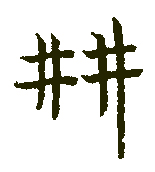
双井 Sosei (Double letter” 井”)
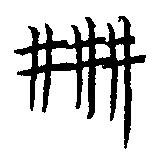
三井 Sansei (Triple letter “井”)
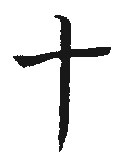
19 一文紋* Ichimonmon (The letter “一”)
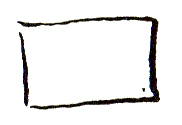
金印 Kin’in (Gold seal)
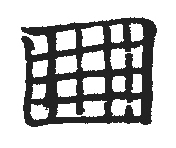
棋盤 Kiban (Japanese chessboard)
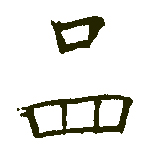
穿銭 Sentsu (Perforated coins)
Moles
It is said that those with moles that can be seen are not very lucky, while those with hidden ones indicate good luck.
Those who have a mole on the indo 印堂, the space between the eyebrows, are noble and wise. Those having one on sasho 左廂, the upper left side of the forehead, will rise to a high rank, or become very wealthy but will live away from their parents from an early age. The left of the tenchu 天中, center top of the forehead is called the tengaku 天岳. The left of tengaku is called the sasho.
A mole on the sole of the foot indicates high rank or wealth and those with a mole on the thigh attend to a person of high rank. Those having one on the left underarm will be successful if they hold a public office. Those with one below the navel are wise and wealthy.
If any other color of a mole is mixed with red or black, it is a sign of bad luck. A mole at the corner of the eyes denotes being evil natured or of thieves. Those with a mole at the corner of the eyes will be killed by an arrow. If you have one on your left side, you will be drowned. Those who have ones in line on the right and left sides of the ears will be disabled. If you have one on the jinchu 人中 philtrum, it is classed as not desirable because you are considered to be single.
If you try to learn to read people’s characters by physiognomy be warned that it is difficult and there is no way of mentioning every detail of it. Only the outline is written here because physiognomy isn’t always right nor has come true since ancient times. For instance, in case that one person has a very undesirable feature while having a very lucky one as well, there is no problem with the fact that they go together. If you try to tell someone’s fortune exactly, by balancing out good and bad, you should consider the details carefully but be warned it still does not always come true. If you concentrate yourself like this, you will try every effort to know the opponent’s intention. However, trying too hard to read from his or her facial features, you may end up staring at his or her face without taking your eyes off them, even for a moment—it would be extremely discourteous and you shouldn’t do that.
Be aware that you should make a concentrated effort to know the opponent’s mind so that you can use the information for your shinobi activities.
This is the end of the middle chapters.
* He writes it in hiragana as えんこう. it is considered to be 円光, which means a halo.
† Cercis Siliquastrum.
* This seemingly impossible trait is also a Buddhist trait.
† The last two here seem like strange ideas because they do not appear in the Buddhist scriptures.
* Remembering that Natori’s version of long hair may be different to modern terms as most had the traditional topknot due to their rank.
* There is no mention of foreign eyes, those being blue or green, as all Japanese people have dark eyes.
* The total number of an adult’s teeth is 32, so the numbers 38, 36, or 34 are impossible and only imaginary.
* A device for public humiliation not dissimilar to the stocks of Europe.
* It seems to be a mistake. Assumingly he meant the letter “十”.